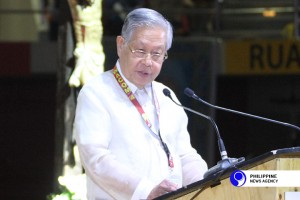
MANILA — The Consultative Committee (ConCom) which drafted the proposed Federal Constitution said that the “anti-poor, anti-Filipino, and pro-political dynasty” remarks of former Chief Justice Hilario Davide on the proposal may have been made out of confusion and lacked sincerity and logic.
“Former Chief Justice Hilario Davide’s statement that the Consultative Committee’s draft Constitution is ‘anti-poor, anti- Filipino and pro dynasty’ betrays his confusion, lack of sincerity and lack of logic in the on-going debate on the proposal to revise the 1987 constitution,” ConCom spokesperson Ding Generoso said in a press statement.
Davide earlier described the proposed Federal Constitution as “anti-poor” since he said Filipinos will have to shoulder additional taxes.
He also said it was “anti-Filipino” because of the absence of the phrase “West Philippine Sea” in the Article I on National Territory.
Generoso, however, stressed that the ConCom draft contains in the Bill of Rights the right of the people to adequate food, decent housing, complete education, comprehensive healthcare, and livelihood and employment opportunities, which were all meant for the poor.
“By putting these in the Bill of Rights, they become demandable from the State, from the government; and the government is mandated to adopt measures and programs toward the progressive realization of these rights,” Generoso said.
“It means that the government must –year after year—adopt comprehensive programs in these areas and increase its budget for them so that the number of Filipinos who go hungry, who have no roof over their heads, who are uneducated, who die without seeing the eye of a doctor, who have no jobs or means to have income will be reduced,” he added.
He also emphasized that the draft also includes a section for providing free legal assistance to indigent Filipinos involved in any legal or administrative proceedings, and a section that provides compensation for individuals unjustly accused, prosecuted, convicted and imprisoned but later found by the courts to be innocent.
Moreover, there is also a provision against discrimination in employment and a provision for protection of overseas Filipino workers, he added.
According to Generoso, the ConCom draft also contains self-executory provisions banning political dynasties, defining the coverage up to second-degree of relations by blood or marriage, which prohibits succession at all levels.
It also prohibits running for or holding more than one position except one national and one regional or local position.
Sovereignty and sovereign rights
Generoso also rejected Davide’s comment that it was anti-Filipino, noting that the ConCom’s Article I has already placed provisions “designed to cement our sovereignty and sovereign rights.”
“The ConCom draft of Article I precisely defines and distinguishes sovereignty and sovereign rights. It states ‘sovereignty over islands and features outside its archipelagic baselines pursuant to the laws of the Federal Republic, the law of nations, and the judgment of competent international courts or tribunals,’” Generoso said.
Generoso pointed out that the phrase “law of nations” refers to the United Nations Convention on the Law of the Sea (UNCLOS) and other conventions that may in the future be agreed upon in the international arena.
He also said that the phrase “judgment of competent international courts or tribunals” refers to the judgment of the Permanent Court of Arbitration.
“To distinguish sovereignty over territory and sovereign rights over waters beyond territorial sea, the ConCom added a section that states ‘sovereign rights over that maritime expanse beyond its territorial sea to the extent reserved to it by international law, as well as over its extended continental shelf,’” he added.
Generoso, meanwhile, said that in making such comments, Davide could be describing the 1987 Constitution and not the the ConCom draft.